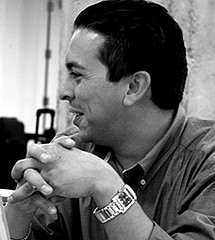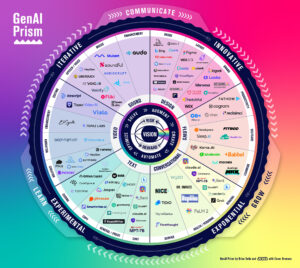I recently ran a post that encapsulated the most current memes on Social Media – what it is, isn’t, and what it should be.
I also made a case for why Social Media should be classified as “Social Media.”
Social media, in principle, is important, as it relates to the democratization of news and information. It represents all of the channels that we the people use to read, write, create, and share information with each other, including blogs, tagging, socialized networks, RSS, communities, podcasts, vlogs, etc.
To me, it’s more about a classification of media, rather than trying to capitalize on trends. But, within hours, the naysayers jumped all over it, calling it yet another buzzword that belonged with the likes of Web 2.0.
Is there an echo, echo, echo, in here? Oh yes,of course, the echo chamber is in full-effect, again. Outside of our little society, the rest of the world is just starting to become familiar with the tools that define social media.
However, to my surprise, I also noticed that Doc Searls wasn’t a fan of the term social media either. He wrote about my post and took the opportunity to clarify his position on the subject.
He wrote, “I avoid using the term “social media”. I don’t like it, and I don’t even want to know what it means. I may talk about blogging and podcasting and syndication and tagging and stuff like that. But I never think about any of those things as “media” and rarely visit their “social” nature (though I am sure they have one). “
Noted.
Scoble then picked up the conversation and added, “Since Doc didn’t give us a good name for this new media collection (blogs, wikis, Web 2.0 voting sites, etc) then I think we’ll just rename it all to “Doc Searls Media.”
He continued, “I don’t care what you call it. Something is going on here and I’m a simpleton and love to have a name for the bag of things that are happening.”
I think we all agree that there are social elements driving the rampant exhange of information among people and its definitely worth documenting. After all, it’s changing how we communicate. The question is, is it media, and, is it right to classify it as social media?
Per Doc’s point, “It’s natural to want to lump technologies and practices together into categories that bear Greater Significance. But for some reason we still drag along the limiting concepts that the new stuff should help us escape, no matter what we call it.”
I agree that lumping things under smaller umbrellas is moot under a bigger dome, but then how do we describe the transformation in media?
For example, how else do we describe the difference between someone simply reading a newspaper article and someone reading the story online, commenting on it, then in turn, writing their own post about the story which then reaches a different set of people, thus potentially sparking a new thread?
Do we call it media, new media, or do we consider this media at all?
Stowe Boyd has talked about Media using social tools to discuss the shift from one-way to the socialized nature of conversations. It seems to be not a matter of “if” but a matter of acceptance.
Chris Heuer added an interesting point in Scoble’s comments, “Regardless, the 5,490,000 results on Google for the phrase “social media” and the 17 Adwords Buyers who are marketing around it speaks for itself. The market is clearly taking to the phrase becuase it is generally descriptive…”
I’ve written quite a bit about the importance of social channels and its integration in, and impact on, traditional media. In some respects, I feel like many of us now have a louder voice because of the new media platform.
However, I think there’s much to do in terms of clarifying and documenting the landscape – and maybe it goes without titles or maybe it needs the comfort of description for those seeking familiarity…
Let’s look at things in a different light though. If I talk to you about media, you’ll have no idea what I could possibly be referring to. You could guess, but it’s no more than a guess. If I say storage media, you’ll think drives. If I say new media, you might think online media/search. If I say traditional media, you might think printed journalism. Or, if I were to say portable media, you would automatically align it with iPods and MP3’s. Then there are terms such as user generated and participatory media…(which could fall under the umbrella of social media). The list could go on and on.
The common trait here, is that there is a descriptor for the various forms of media. And for the most part, we accept them.
Social Media is only a buzzword if certain individuals decide to call it such because they don’t understand what or why it is.
In my opinion, Social Media is more of description in order to frame media in a socialized context rather than hype.
But still, the question of “What’s Wrong with Social Media?” still largely goes unanswered by the community – other than many do not like the term.
Chances are, that the people lambasting it are not the ones defining or creating it.
The revolution will be socialized. Engage or step aside.
[Update: For a primer on social media, visit Blue Whal Labs.]
socialmediaclub social media 2.0 media+2.0 media2.0 “media 2.0″ chris+heuer social+media tools doc+searls robert+scoble pr2.0 brian+solis stowe+boyd networks rss blogs ipod medium









Great post. I’ve been following this debate for a day or 2, and I think I have to take Scoble’s side on this one. Let’s just admit something has happened and have a name for it and move on.
I completely agree with Michael’s comment. How much energy have we wasted worrying about the semantics of this movement? I realize the impact that language has on defining what we do, but just think how much more we could accomplish if we focus on developing these “things” (whatever you want to call them).
This discussion over the “Social Media” label, for me, amounts to a bunch of hairsplitting. Do you generally know what I’m talking about if I use the term, “Social Media?” Yes? Then the label does its job.
I understand and agree with Doc Searls point about “an accessory to our humanity”. However, to gain wider adoption and hence fulfill the potential of these new communication tools to make things better for the world, we need language hooks so things don’t get lost in translation. I think social media is pretty good but if Doc wanted to go with, as he seems to imply, “informed authoring” or as a hybrid (and perhaps more on point) “informed social authoring”, so be it! There is no denying the social aspect of what’s happening because we are engaging and connecting with each other as we bring to bare our unique and “informed” perspectives.
I believe that language is a precursor to consciousness and the naming of things harkens back to a time whence to name was to truly know.
With the advent of more recent web technologies, social media, user generated content, crowdsourcing and other myriad virtual realities, a new generation of participants are aboard this vehicle called the web who now gravitate to a process rich experience. This impulse, however named, is being examined and I can’t wait for the details to burgeon forth.
Add to the above list an example of research and development that’s taking place in semantics.
http://novaspivack.typepad.com/nova_spivacks_weblog/2007/02/steps_towards_a.html
Fantastic attempts by Lessig and others to shape political attitudes.
http://www.lessig.org/blog/archives/Spectrum_small.mov
The landscape is not only going to change but the ride is going to be wild.
All cultural/social/technological paradigm changes create new phenomenological experiences and those are what I am interested in.
Alan.
Sorry, posted wrong link for semantics.
This one should be better:
http://novaspivack.typepad.com/nova_spivacks_weblog/2007/02/web_30_roundup_.html
“Social Media is only a buzzword if certain individuals decide to call it such because they don’t understand what or why it is.”
have you ever read from?
first newspapers were social media in complex society. it is only about improved communication. hence: using it by certain individuals it becomes buzzword because you are trying to give more meaning to something that is “just” complexity – improved capabilities for social interaction and computations.
Michael, thank you good point.
Shannon, yes, indeed. The label does its job…in my opinion.
Karim, really interesting take. Read your post on “informed social authoring” and I think everyone agrees that it all comes down to social roots.
Alan, yes, the landscape will change even more dramatically. Looking foward to the conversations that spur as people try to categorize and document it.
Ace, I like your position. Do you think that social media in its original context was social because it sparked word of mouth…whereas today the tools enable something more powerful, something like word of mouse?
Here’s a very thorough on social media and social tools from Stowe Boyd and Greg Narain
A someone who is diving into this world and learning from the masters (like Doc Searls and Scoble) I find it interesting that there is a debate at all about the terms used to describe this shift in communication and how people are connecting. Isn’t it the very nature of the beast to let it define itself or at the very least leave it to the masses to define it? It seems to me that this communication style works better the less said or done to label it. To define is to limit what it can be so why lable it at all? Let’s just keep developing it and the masters can save their words and brain power for making it better- whatever “it” and let it be called whatever it will be called.
“Ace, I like your position. Do you think that social media in its original context was social because it sparked word of mouth…whereas today the tools enable something more powerful, something like word of mouse”
when we say social media we say media that activates social interactions. in it’s essence it does not matter is it key press or print press. in social matrix social interactions (amongst individuals) are in essence informations computations (information processing). what has been changed since gutenberg. social media context. and that context did not created new social media, it created improved (evolved) social media and it will continue to do so.
Therrick, your question, “Isn’t it the very nature of the beast to let it define itself or at the very least leave it to the masses to define it?” Yes, absolutely. And through extensive research, polling and experimentation, the term social media is the one most widely used and understood.
Ace, again, great comment. “when we say social media we say media that activates social interactions.” Indeed. Whereas previously, whether print or brodcast, most of the media was for private consumption with the more compelling stories sparking word of mouth. I truly believe that “media” has grown to acheive its greatest levels of influence to date while also empowering “we the people” with our own channels to share information.